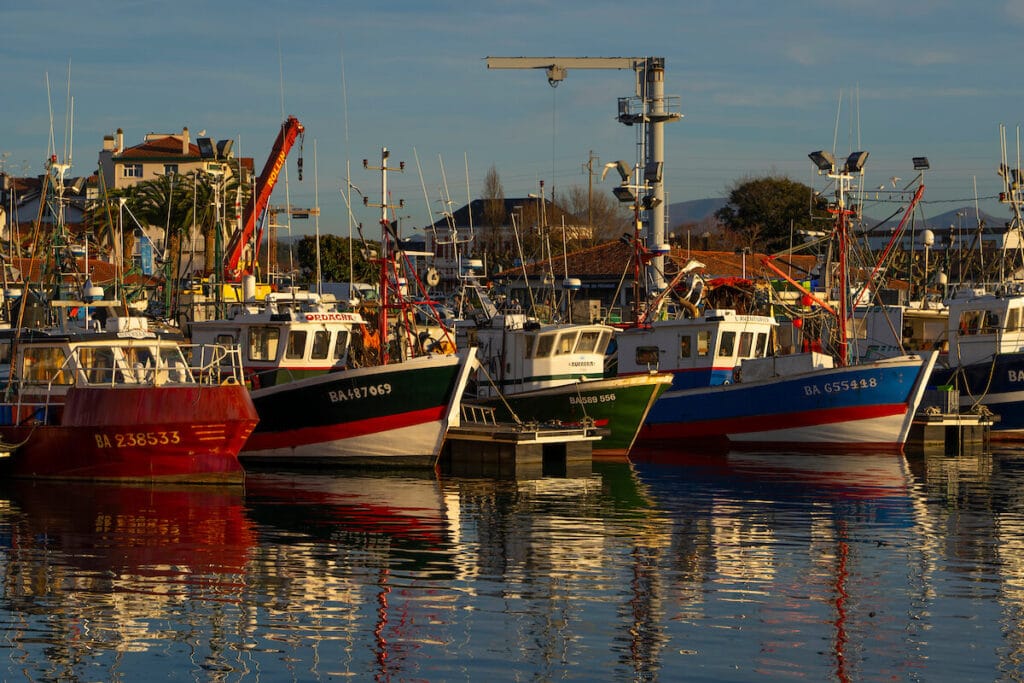
Small-scale fishing vessels in Saint-Jean de Luz, France. Photograph: Dave Walsh
Brussels, 12 May 2022:- Responding to the May 11th vote by the EU Parliament PECH Committee to pass the Draft report on the implementation of Article 17 of the Common Fisheries Policy [1,2], which aims to incentivise fishing in the most sustainable manner by giving priority access to resources, Rebecca Hubbard, Programme Director for Our Fish said [3]:
“Our Fish welcomes the outcome of the PECH Committee vote, which sends a clear message to the EU Commission that it must do more to guide EU member states, and for EU governments to ensure they allocate fishing quotas based on a fair and transparent process, using environmental, social and economic criteria, in order to end overfishing and deliver on the EU’s Biodiversity Strategy [4]. These criteria can include climate and ecosystem considerations, the compliance history of fishers, and the contribution to the local economy.”
Article 17 of the European Union’s Commission Fisheries Policy states that “when allocating the fishing opportunities available to them… Member States shall use transparent and objective criteria including those of an environmental, social and economic nature”. It lists as criteria “the impact of fishing on the environment, the history of compliance, the contribution to the local economy and historic catch levels”. Article 17 also outlines that “within the fishing opportunities (i.e. quotas) allocated to them, Member States shall endeavour to provide incentives to fishing vessels deploying selective fishing gear or using fishing techniques with reduced environmental impact, such as reduced energy consumption or habitat damage.”
“The EU Common Fisheries Policy is designed to ensure that the transparent allocation of fishing quotas is used as an incentive to improve environmental, social and economic outcomes; in fact it requires it. However, EU member states have so far ignored this requirement and have spent eight years squandering this opportunity to accelerate a transition to low-impact, low-carbon fishing”, said Hubbard.
“Today’s vote adds much-needed political support for harnessing this powerful tool to end overfishing, restore ocean health, deliver climate action, and secure the future of coastal communities, and provides Commissioner Sinkevičius and EU Fisheries Ministers with the perfect opportunity to transition the industry and the ocean to a position where they are in the best possible place to both act on, and withstand, the challenges we are facing with the climate and nature crisis”, concluded Hubbard.
Contacts
Dave Walsh, Our Fish Communications: press@our.fish, +34 691 826 764
Notes:
[1] The implementation of Article 17 of the Common Fisheries Policy Regulation 2021/2168 (INI) Own Initiative Procedure https://oeil.secure.europarl.europa.eu/oeil/popups/ficheprocedure.do?reference=2021/2168(INI)&l=en
[2] CFP REGULATION (EU) No 1380/2013
Article 17. Criteria for the allocation of fishing opportunities by Member States
When allocating the fishing opportunities available to them, as referred to in Article 16, Member States shall use transparent and objective criteria including those of an environmental, social and economic nature. The criteria to be used may include, inter alia, the impact of fishing on the environment, the history of compliance, the contribution to the local economy and historic catch levels. Within the fishing opportunities allocated to them, Member States shall endeavour to provide incentives to fishing vessels deploying selective fishing gear or using fishing techniques with reduced environmental impact, such as reduced energy consumption or habitat damage.
https://eur-lex.europa.eu/legal-content/EN/TXT/?uri=celex%3A32013R1380
[3] Report: How the EU can Transition to Low Environmental Impact, Low Carbon, Socially Just Fishing
Fishing Opportunities as an Agent of Change
Low Impact Fishers of Europe and Our Fish, October 2021
In principle, the allocation of fishing opportunities, e.g. quotas has the potential to ensure environmentally sustainable and socially just fisheries. The EU already has legislation in place for this purpose, but lacks both the political will and a clear mechanism for implementation, and as a result, has so far failed to realise the potential environmental and social benefits.
There is a solution: activating Article 17 of the Common Fisheries Policy to reallocate fishing quotas to the “forgotten” small-scale low-impact fleet, which for historic reasons has had restricted access to quota species. In the context of the climate and biodiversity crises, a just transition to a low-carbon, low-impact EU fishing fleet is critical. This report proposes criteria and processes which the European Commission and member states could harness in order to enable a transition to a more ecologically, socially and economically sustainable fishing industry.
Press release: EU Holds Key To Just Transition to Low-Carbon, Low-Impact Fishing Industry –
[4] Biodiversity strategy for 2030
https://ec.europa.eu/environment/strategy/biodiversity-strategy-2030_en
About Our Fish
Our Fish is working to end overfishing and restore a healthy ocean ecosystem. By collaborating with others, and deploying robust evidence, we are calling for an end to overfishing as a critical and significant action to address the biodiversity and climate crisis. https://our.fish
